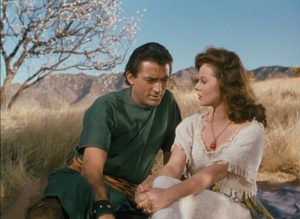Abuse survivor and victims’ advocate Rachael Denhollander said a lot at last week’s Caring Well Conference sponsored by the Southern Baptist Convention Ethics & Religious Liberty Commission, but perhaps nothing grabbed attention like her advice to use care when interpreting Bible stories such as the Old Testament tale of David and Bathsheba.
“David didn’t fornicate; David raped,” said the attorney and stay-at-home mother who rose to national fame as star witness in the trial of serial abuser and former USA Gymnastics team doctor Larry Nassar.

“Who wants to see Gregory Peck as a sexual predator?” David and Diana Garland asked in a chapter on the story of David and Bathsheba published in 2007. (IMDB)
The reference is to the account in the 11th chapter of the second book of Samuel where David, a heroic figure in the Hebrew Bible, spies a woman bathing on a neighbor’s rooftop. He sends for her while her husband is away at war, gets her pregnant and then seeks to cover his sin by plotting the husband’s murder. While the narrative focuses on the interaction between David, Uriah and ultimately the prophet Nathan, it is not uncommon for preachers to portray Bathsheba as a femme fatale.
“If you understand the power dynamics and you understand the Hebrew, and you look at the Levitical examples and discussion of rape, and you understand what Nathan is saying in his parable, it is abundantly clear from that text that David raped,” said Denhollander, whose husband, Jacob Denhollander, is a Ph.D. student at Southern Baptist Theological Seminary.
The comment expanded on something she had said on Twitter on Oct. 3 in response to a list of Bible characters who sinned which included the example, “David fornicated.”
“David raped,” Denhollander tweeted. “It’s important we get that right.”
The Twitterverse exploded.
“I love what the Denhollanders have done for victim awareness, but this kind of thing is a perfect example of why it’s really dangerous to let your own experiences cloud the way you read and understand scripture,” commented a pastor in Chicago.
Jacob Denhollander rushed to his spouse’s defense. “You can disagree with her interpretation of Scripture without disparaging her as being too emotional to properly interpret Scripture or speak on this issue with clarity,” he replied. “You simply assume she’s too ‘clouded’ on the basis that you disagree. That’s unfair and dismissive.”
Others charged the couple with reading modern views into an ancient text.
“If she wasn’t a willing participant, she could have simply refused and dealt with the consequences,” a male commenter argued against viewing Bathsheba as blameless in the affair. “Countless people have chosen death over violating their own consciences.”
“If she’s not dead, it means she’s an adulterous woman,” Mr. Denhollander paraphrased in his reply.
Still others pointed out that gender bias applies equally to both women and men.
A woman who grew up being taught that Bathsheba purposely bathed in view of the king to get his attention called it “the Sunday school version of ‘what were you wearing when you were assaulted?’”
The Denhollanders aren’t the first Baptist couple to broach the problem of misogynistic readings of the story of David and Bathsheba.
David Garland, then dean of the George W. Truett Theological Seminary, and wife Diana Garland, dean of Baylor’s school of social work who died of cancer in 2015, discussed it in their book Flawed Families of the Bible: How God’s Grace Works through Imperfect Relationships, published in 2007.
“Artists and interpreters over the centuries have turned this particular woman into a painted sex kitten who bewitched a divinely chosen king,” the Garlands said in a chapter excerpt reprinted with permission in the Baylor school of social work’s journal.
“They accuse her of deliberately choosing to bathe in a place where she knew she could be seen by the king,” the authors said. “They imagine her coquettishly parading around naked to catch the king’s eye. As a consequence of this portrayal of the scene, David seems almost a helpless victim in the sights of a conniving vixen determined to seduce him.”
 The Garlands said that portrayal – popularized with much artistic license in 1951 movie David and Bathsheba featuring Gregory Peck and Susan Hayward – is not supported by scripture.
The Garlands said that portrayal – popularized with much artistic license in 1951 movie David and Bathsheba featuring Gregory Peck and Susan Hayward – is not supported by scripture.
In the Bible, they said, Bathsheba “is not taking a bubble bath or lounging in a hot tub” but a required ritual washing at the conclusion of her menstrual period. There is not even reason to assume she was naked, they said, because if she were in public view she would have washed without disrobing.
“Public nudity was not acceptable in this ancient Jewish culture but instead was considered shameful,” the Garlands said. “There is no foundation for assuming she was some kind of exhibitionist.”
“Male-dominated cultures like Bathsheba’s and our own teach women that they are responsible for men’s lust,” they said. “Women may think and may have been told that their behavior evokes this response in men – somehow they have telegraphed availability messages. As a consequence, when men lust after them, some women feel guilty. Somehow, they think they have caused the sexual harassment, the unwanted sexual come-ons or touching, or even the rape.”
The Garlands said nothing in the Bible story suggests Bathsheba’s compliance with the king’s order was voluntary.
“She was his subject, and she knew his sterling reputation as God’s appointed leader, a man purportedly just and righteous,” they said. “She did not know about the vermin crawling around beneath the floorboards of his religious façade and reputation. She did not know that he was capable of stooping so low to trap and use her to satisfy his burning lusts.”
“The setup was complete,” they continued. “By acquiescing to go with the king’s messengers, suddenly she found herself in a compromising position, alone with the king. Who would believe her should she accuse him of any wrongdoing? It was her word against his, and he was the great king. She was only a woman. There was no escape.”
“Bathsheba was sent for and was taken,” the Garlands said. “This was no sexual affair. An affair assumes mutual consent, and there was no indication – or even possibility for – consent. She was in a position that rendered her powerless to give consent.”
They said her portrayal in the public imagination “only compounds the injustice of her rape by making her a seductress rather than a victim of the king’s abuse.”
“She was beautiful and desirable to a lecherous monarch, but that does not make her an adulteress,” they said. “She did not ask for this. The problem with sin is that it does not simply affect the one who commits it. The fallout spreads to innocent and guilty alike. Though guiltless, the victim suffers punishment.”
“Perhaps, since David is a biblical hero, readers want to clear him of any unscrupulous behavior,” the Garlands concluded. “As when pastors abuse their power, people want to turn a blind eye or make excuses for him.”
Previous stories:
Caring well? Speaker says Baptist Press reported abuse disclosure as a consensual affair
Caring well? Expert berates Southern Baptists for ignoring sexual abuse
Caring well? Conference cites failures in the Southern Baptist Convention’s response to sexual abuse
